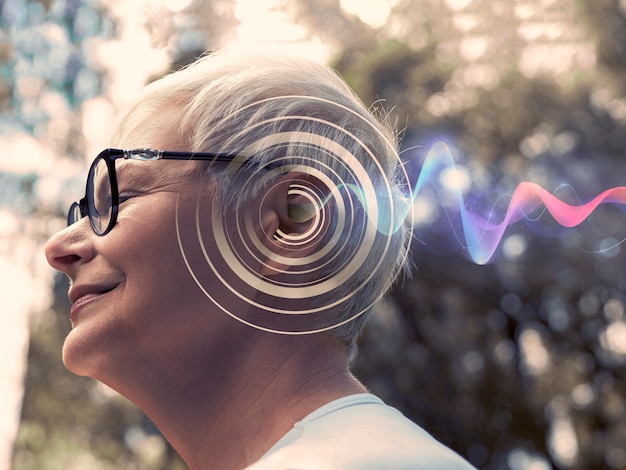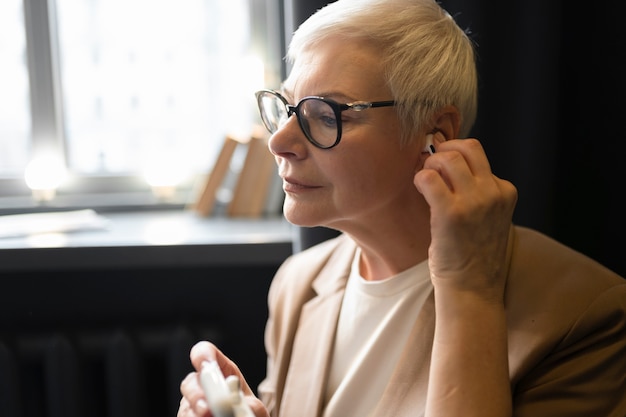Dementia affects millions of people worldwide, and while there is no cure, a growing body of evidence suggests that prevention may be closer than we think. Surprisingly, one of the most powerful tools in the fight against cognitive decline may not be a pill or a surgical procedure—but a hearing aid.
Recent studies, including a landmark analysis published in JAMA, have found that up to 40% of dementia cases could be linked to modifiable risk factors. Among these, untreated hearing loss stands out as one of the most significant and actionable contributors—especially in mid-life and older adults.
Hearing loss is often dismissed as a normal part of aging. But mounting research shows it’s far more than just a communication issue. A Johns Hopkins study revealed that individuals with untreated hearing loss are up to twice as likely to develop dementia over time compared to those with normal hearing.
One major reason? The brain works harder to process sound when hearing is impaired. This cognitive overload can strain neural resources, potentially accelerating brain atrophy in regions linked to memory and thinking. Additionally, hearing loss often leads to social withdrawal, loneliness, and depression—factors independently associated with higher dementia risk.

The good news? Treating hearing loss with hearing aids may significantly reduce the risk of cognitive decline. A large-scale study tracking older adults over several years found that those who used hearing aids had a 32% lower risk of being diagnosed with dementia compared to those who did not.
Hearing aids don’t just amplify sound—they help maintain the brain’s auditory processing networks. By restoring access to speech and environmental sounds, they reduce cognitive load and keep the brain engaged. This neural stimulation may help preserve cognitive function over time.
Moreover, hearing aids improve social participation. When people can hear conversations clearly, they’re more likely to stay socially active, reducing isolation—a known risk factor for dementia.
The window for intervention appears to be in mid-life, around ages 45 to 65. This is when hearing loss often begins, yet many people wait years—or even decades—before seeking help. On average, individuals wait about seven years after noticing symptoms to get hearing aids.
Experts stress that early treatment is crucial. The longer hearing loss goes untreated, the more difficult it becomes for the brain to relearn how to process sounds—even after amplification is introduced. Early use of hearing aids may help 'lock in' auditory pathways and support long-term brain health.

Despite their potential benefits, only about 1 in 5 people who could benefit from hearing aids actually use them. Common barriers include cost, stigma, lack of awareness, and the misconception that hearing loss isn’t serious.
However, attitudes are shifting. Over-the-counter (OTC) hearing aids, now available in many countries, have made treatment more accessible and affordable. These devices, while not suitable for all types of hearing loss, offer a low-barrier entry point for mild to moderate cases.
Public health campaigns are also helping to reframe hearing loss as a treatable medical condition—not just an inevitable part of aging. Just as we monitor blood pressure and cholesterol to protect heart health, hearing should be part of routine preventive care.
If you or a loved one has noticed difficulty hearing—such as trouble following conversations, frequently asking people to repeat themselves, or turning up the TV volume—don’t ignore it. Take these steps:
Protecting your hearing isn’t just about staying connected—it’s about safeguarding your mind. With 40% of dementia cases potentially preventable through lifestyle and health interventions, treating hearing loss may be one of the most effective strategies we have.
Hearing aids are no longer just assistive devices—they’re emerging as powerful tools in dementia prevention. By addressing hearing loss early and consistently, individuals may not only improve their quality of life but also reduce their long-term risk of cognitive decline.
The message is clear: Don’t wait. Your brain might be listening.

Health

Health

Health

Health

Health

Health

Health

Health

Health

Wellness

Health

Health

Health

Fitness

Health

Health